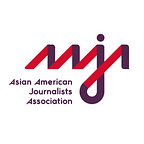Bridging History and Self: Filipinx American History Month Defined with Nicole Dungca
Our incoming AAJA president discussed how her identity impacts her work as a news leader
By Joseph Malasa, Special Initiatives and Operations Fellow
This October has marked another month of celebrating Filipino American History Month (FAHM). To honor Filipinx activists who were often omitted from American history, the Filipino American National Historical Society started the proposal for FAHM in 1992. The late prominent scholar-activist Dawn Mabalon discussed how this month is uniquely about history, not heritage.
A common phrase in advocating for Filipinx studies is “know history, know self,” which references historical amnesia, where people do not learn historical events related to their experiences. FAHM is a time in which this tension takes center stage for me. Throughout my life, I have second-guessed my credibility to speak out about my feelings of insecurity and disconnection to knowing Filipinx history. However, I share this struggle as my own part of Filipinx history: sharing narratives together rather than approaching them alone.
I was excited to interview an inspiring figure in AAJA: our incoming president, Nicole Dungca. Nicole is an investigative reporter at The Washington Post and our Senior Vice President until she assumes the presidency in 2023. Through this interview, I hope to further explore what FAHM means to her as she navigates her own personal and professional experiences and bridges them with the past histories of Filipinx communities.
JOSEPH MALASA (he/him): Who is Nicole? Tell us a little about yourself.
NICOLE DUNGCA (she/her): I’m a Filipina American who grew up in the Bay Area and criss-crossed the country before joining The Washington Post as an investigative reporter. Along the way, I’ve been volunteering for AAJA because I deeply care about the cause of media diversity and making sure our communities are accurately reflected in all the news we consume.
What do you believe is the relevance of Filipinx American history in your life and identity?
NICOLE: As a child, I was constantly surrounded by Filipinos — either in my typical, giant Filipino family (hello to all my titos and titas) or out in my Bay Area communities, which were home to hundreds of thousands of people from the Filipino diaspora.
Learning about our history and resilience gave me a strong sense of self and identity that has carried me throughout my career. It has always reminded me that, as Filipinos, we are an essential part of American history. We helped shape this country and will always have the power to do so — and organizations like AAJA can ensure that by making sure our stories are told and valued.
How does your identity as a Filipina American impact your work as a news leader?
NICOLE: It’s no surprise that Filipino leaders are not the norm in the news industry. Stepping into different newsrooms across the country could always feel a bit disorienting when I was younger, because I saw so few people who grew up like me, who knew my story. But I’ve always wanted to use that feeling as fuel, as a reason to keep going so that I could help get more Filipino Americans into the industry, to help tell even more stories of Filipinos in this country and throughout the world.
As Filipinos, we are an essential part of American history. We helped shape this country and will always have the power to do so.
What do you envision for AAJA’s future in advocating for AAPI narratives in journalism and how do you plan to bridge past, present, and future histories?
NICOLE: AAJA was started more than 40 years ago because there weren’t enough AAPIs in newsrooms, and that still holds true today. I want to make sure that Asian Americans and Pacific Islanders are leading newsrooms and conversations across the industry. We need AAPI decision-makers to help drive coverage for our communities that are often underrepresented, and make sure it’s being done accurately. If newsrooms and our coverage don’t reflect our communities, we’re failing at our jobs.
We’re already making change in a lot of ways: working together with newsrooms all across the world to make sure they’re hiring and retaining our members, showing the racial disparities in those newsrooms and putting out frequent style advisories to make sure we’re shaping coverage. But there’s still so much work to be done, and I’m eager to keep working with AAJA and other partner organizations to keep advocating for our communities.
Even past this month, AAJA Defined acts as an opportunity to uplift more AAPI narratives to include and honor them in our AAJA community’s history book. Liked this piece? Share it on social media and follow AAJA Defined as we continue to chat with AAPI journalists and share their stories.
Nicole Dungca is an investigative reporter for The Washington Post. Follow her on Twitter.
Joe Malasa is the Special Initiatives and Operations Fellow at AAJA. He is based in San Francisco, California. Connect with him on LinkedIn.
